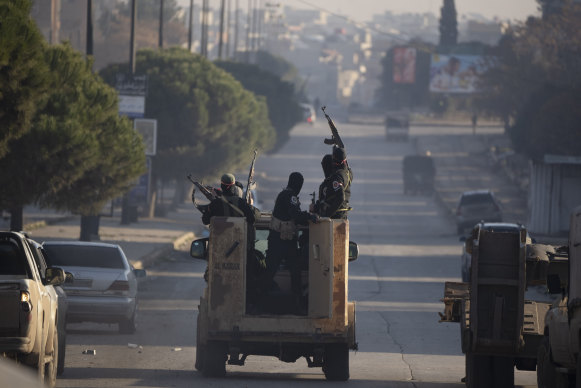Shiyar Khaleal, another activist and journalist, also warned that “education based on extremist ideologies can shape individuals whose ideas threaten regional and international security.”
The changes were posted on the Syrian Ministry of Education’s Facebook page on Wednesday, along with a statement that the country’s nationalist education would be replaced by “Islamic or Christian” religious teachings.
Members of the new security forces participate on Thursday in Homs (according to state media) in an operation to arrest militiamen affiliated with the ousted president Bashar al-Assad.Credit: AP
Also included in the new curriculum is the claim that “Jews” and “Nasara,” a derogatory term for Christians, are the subject of a Quranic verse about people who had angered God.
Philosophy units on topics such as Chinese thought will also be removed and remaining content will be rephrased, as will texts referencing the rule of the Ottoman Empire, which was previously described as “brutal Ottoman authority.”
The amendments also include the removal of content about Assad, something that has been welcomed, as well as dozens of other changes to the study of science, religion and history.
Charging
The national anthem has also been removed from textbooks and is described by the ministry as “the (Assad) anthem of the regime.”
Hussam Hammoud, a Syrian journalist, wrote on social media: “After reviewing the amendments, it is clear that, in addition to removing signs of Assad’s criminal regime, the rest (of the) changes have a distinctive religious tone.”
He added that some citizens had called to protest against the changes.
Syria’s Education Ministry released a statement Thursday saying the curriculum would remain in effect until it was reviewed by a specialized committee.
A spokesman added that officials had ordered the removal of only content that glorified “the late Assad regime” and that school books would be updated to include the flag of the Syrian revolution.
He also said other amendments were related to “incorrect information” that had been adopted by the previous regime.
Syria’s de facto leader Ahmed al-Sharaa (foreground), formerly known as Abu Mohammed al-Jolani.Credit: AP
The ministry previously announced that it would not restrict girls’ rights to education and that primary schools would remain coeducational.
Joshua Landis, director of the Center for Middle East Studies at the University of Oklahoma, said the proposed curriculum suggested a shift from a “nationalist to an Islamist interpretation of Syrian history.”
He wrote on social media: “There is nothing surprising about these changes to Syria’s school textbooks. They are in line with traditional Islamic education.
“The problem is that they will scandalize secular Syrians and many Christians, not to mention the Alawites, Druze and Ismailis, who are considered worse than Christians and Jews and who are not protected by Islamic law.”

A couple watches the sunset atop Mount Qassioun, which was opened to the public after the fall of the Assad regime.Credit: AP
He added: “Equally important, Western powers and Israel will worry that (Ahmed) Sharaa’s government is raising a new generation to attack Israel. This may delay the lifting of sanctions, which will be so important for the success of the new Syria.”
De facto ruler Ahmed al-Sharaa, formerly known by his nom de guerre Abu Mohammed al-Jolani, has sought to calm the concerns of Syrian minorities, meeting with community leaders and promising to respect Syria’s ethnic and religious diversity.
Charging
Following the overthrow of the Assad regime almost a month ago, the country is now coming to terms with the widespread destruction left by 13 years of civil war.
The new Ministry of Education faces a mammoth task, with half of the country’s schools destroyed or damaged during the war. More than half of Syrian children – around 3.7 million – are out of school, Save the Youngsters said.
Meanwhile, on Wednesday, Syria’s new Foreign Minister Asaad al-Shaibani traveled to Saudi Arabia, marking the transitional government’s first official foreign visit.
He wrote on social media: “Through this first visit in the history of free Syria, we aim to open a bright new page in Syrian-Saudi relations, in line with the long history shared between the two countries.”
Sharaa told Saudi state television last week that the country “will certainly play an important role in the future of Syria.”
The Telegraph, London
Get a note directly from our foreigner correspondents about what’s making headlines around the world. Subscribe to our weekly newsletter What within the World.





